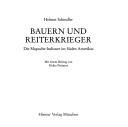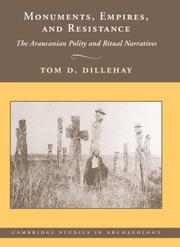| Listing 1 - 10 of 19 | << page >> |
Sort by
|
Book
ISBN: 0813046270 0813045029 9780813045023 9780813046273 9780813044286 0813044286 Year: 2012 Publisher: Gainesville University Press of Florida
Abstract | Keywords | Export | Availability | Bookmark
 Loading...
Loading...Choose an application
- Reference Manager
- EndNote
- RefWorks (Direct export to RefWorks)
Traces the history of the Mapuche and Chile from the initial colonization of Mapuche land in the mid-nineteenth century to the present day.
Indians of South America --- Mapuche Indians --- Araucanian Indians --- Araucano Indians --- Araukan Indians --- Auca Indians (Chile) --- Aucan Indians --- Aucanian Indians --- Maluche Indians --- Mapudungu Indians --- Mapunche Indians --- Vilimuluche Indians --- Social life and customs. --- History.

Abstract | Keywords | Export | Availability | Bookmark
 Loading...
Loading...Choose an application
- Reference Manager
- EndNote
- RefWorks (Direct export to RefWorks)
Mapuche Indians --- Araucan (Indiens) --- Mapuche (Indiens) --- Material culture. --- Social life and customs. --- Culture matérielle --- Moeurs et coutumes --- -Mapuche Indians --- -Araucanian Indians --- Araucano Indians --- Araukan Indians --- Auca Indians (Chile) --- Aucan Indians --- Aucanian Indians --- Maluche Indians --- Mapudungu Indians --- Mapunche Indians --- Vilimuluche Indians --- Indians of South America --- Material culture --- Social life and customs --- -Material culture --- Culture matérielle --- Araucanian Indians
Book
ISBN: 0822978679 9780822978671 9780822962373 0822962373 Year: 2013 Publisher: Pittsburgh, Pa.
Abstract | Keywords | Export | Availability | Bookmark
 Loading...
Loading...Choose an application
- Reference Manager
- EndNote
- RefWorks (Direct export to RefWorks)
Mapuche Indians --- Araucanian Indians --- Araucano Indians --- Araukan Indians --- Auca Indians (Chile) --- Aucan Indians --- Aucanian Indians --- Maluche Indians --- Mapudungu Indians --- Mapunche Indians --- Vilimuluche Indians --- Indians of South America --- Civil rights --- Government relations. --- Araucanía (Chile) --- IX Región (Chile) --- Región IX (Chile) --- Novena Región (Chile) --- 9a Región (Chile) --- Araucanie (Chile) --- Race relations.
Book
ISBN: 1139226851 110804946X Year: 2013 Publisher: Cambridge : Cambridge University Press,
Abstract | Keywords | Export | Availability | Bookmark
 Loading...
Loading...Choose an application
- Reference Manager
- EndNote
- RefWorks (Direct export to RefWorks)
Juan Ignacio Molina (1740-1829) was a Jesuit priest born in Chile but forced to flee to Europe after his religious order was expelled from the Spanish Empire in 1767. He settled in Bologna, Italy, and began to write a natural history of his homeland, which was first published in Italian in 1782 (he is also known as Giovanni Ignazio Molina). He completed a second volume on the history of the people of Chile in 1786, and a version of the book was in the library of HMS Beagle. This two-volume English translation was published in 1809, and also includes notes from other explorers, including a 1791 account of Chile by Pedro Gonzalez de Agueros (1768-93) and a 1774 description of Patagonia by Thomas Falkner (1707-84). Volume 2 covers the 'civil history' of Chile, discussing the indigenous people living there and the arrival of Spanish settlers.
Mapuche language. --- Mapuche Indians. --- Chile --- History --- Araucanian Indians --- Araucano Indians --- Araukan Indians --- Auca Indians (Chile) --- Aucan Indians --- Aucanian Indians --- Maluche Indians --- Mapudungu Indians --- Mapunche Indians --- Vilimuluche Indians --- Indians of South America --- Araucanian language --- Araucano language --- Araukan language --- Aucan language --- Aucanian language --- Maluche language --- Mapudungu language --- Mapudungun language --- Vilimuche language --- Penutian languages

ISBN: 1282920464 9786612920462 0822384213 0822329344 082232962X Year: 2002 Publisher: Durham [N.C.] : Duke University Press,
Abstract | Keywords | Export | Availability | Bookmark
 Loading...
Loading...Choose an application
- Reference Manager
- EndNote
- RefWorks (Direct export to RefWorks)
Testimonial text by a Mapuche woman, with commentary and other ethnographic interventions by a U.S. historian.
Mapuche women --- Feminists --- Women social reformers --- Mapuche Indians --- Araucanian Indians --- Araucano Indians --- Araukan Indians --- Auca Indians (Chile) --- Aucan Indians --- Aucanian Indians --- Maluche Indians --- Mapudungu Indians --- Mapunche Indians --- Vilimuluche Indians --- Indians of South America --- Women, Mapuche --- Women --- Social reformers --- Feminism --- Social conditions. --- Land tenure. --- Politics and government. --- Reuque Paillalef, Rosa Isolde, --- Paillalef, Rosa Isolde Reuque, --- Chile --- History --- Politics and government

ISBN: 9780521872621 0521872626 9780511499715 9781107407749 9780511275616 0511275617 9780511273384 051127338X 0511274912 9780511274916 051149971X 9786610815791 6610815798 1107172144 1280815795 0511321597 0511274173 1107407745 Year: 2007 Volume: *2 Publisher: Cambridge University press
Abstract | Keywords | Export | Availability | Bookmark
 Loading...
Loading...Choose an application
- Reference Manager
- EndNote
- RefWorks (Direct export to RefWorks)
From AD 1550 to 1850, the Araucanian polity in southern Chile was a center of political resistance to the intruding Spanish empire. In this 2007 book, Tom D. Dillehay examines the resistance strategies of the Araucanians and how they used mound building and other sacred monuments to reorganize their political and culture life in order to unite against the Spanish. Drawing on anthropological research conducted over three decades, Dillehay focuses on the development of leadership, shamanism, ritual, and power relations. His study combines developments in social theory with the archaeological, ethnographic, and historical records. Both theoretically and empirically informed, this book is a fascinating account of the only indigenous ethnic group to successfully resist outsiders for more than three centuries and to flourish under these conditions.
Mapuche Indians --- Mounds --- Barrows --- Tumuli --- Archaeology --- Landforms --- Tombs --- Araucanian Indians --- Araucano Indians --- Araukan Indians --- Auca Indians (Chile) --- Aucan Indians --- Aucanian Indians --- Maluche Indians --- Mapudungu Indians --- Mapunche Indians --- Vilimuluche Indians --- Indians of South America --- History --- Social life and customs --- Wars --- Araucanía (Chile) --- Chile --- Spain --- IX Región (Chile) --- Región IX (Chile) --- Novena Región (Chile) --- 9a Región (Chile) --- Araucanie (Chile) --- History. --- Social life and customs. --- Colonies --- Wars. --- Social Sciences --- Archeology --- Araucania (Chile)
Book
ISBN: 0903983370 Year: 1976 Publisher: London Hurst
Abstract | Keywords | Export | Availability | Bookmark
 Loading...
Loading...Choose an application
- Reference Manager
- EndNote
- RefWorks (Direct export to RefWorks)
Araucanian Indians --- Indians of South America --- Social life and customs --- Economic conditions --- 39 <83> --- -Mapuche Indians --- -#SBIB:39A74 --- Araucano Indians --- Araukan Indians --- Auca Indians (Chile) --- Aucan Indians --- Aucanian Indians --- Maluche Indians --- Mapudungu Indians --- Mapunche Indians --- Vilimuluche Indians --- American aborigines --- American Indians --- Indigenous peoples --- Volkenkunde. Zeden en gebruiken. Culturele antropologie--Chili --- Etnografie: Amerika --- Ethnology --- 39 <83> Volkenkunde. Zeden en gebruiken. Culturele antropologie--Chili --- Mapuche Indians --- Social life and customs. --- Economic conditions. --- #SBIB:39A74
Book
ISBN: 8070361212 Year: 2001 Publisher: Praha Národní muzeum. Náprstkovo muzeum
Abstract | Keywords | Export | Availability | Bookmark
 Loading...
Loading...Choose an application
- Reference Manager
- EndNote
- RefWorks (Direct export to RefWorks)
Mapuche art
---
Mapuche Indians
---
Mapuche sculpture
---
Mapuche silverwork
---
#BIBC:ruil
Book
ISBN: 077342041X 9780773420410 9780773416093 0773416099 Year: 2011 Publisher: Lewiston, NY Edwin Mellen Press
Abstract | Keywords | Export | Availability | Bookmark
 Loading...
Loading...Choose an application
- Reference Manager
- EndNote
- RefWorks (Direct export to RefWorks)
Narrated by Carlos Quilaqueo, and meticulously transcribed and analyzed by Perea-Fox and Iriarte, this collection of Mapuche stories is an invaluable resource for Mapuche cultural, literary, and anthropological studies.This text is the most complete collection and first direct transcription of Mapuche oral histories, myths, and legends
Laguna Blanca (Argentina) -- Folklore. --- Laguna Blanca (Argentina) -- History. --- Mapuche Indians -- Argentina -- Laguna Blanca -- Folklore. --- Mapuche mythology -- Argentina -- Laguna Blance. --- Mapuche Indians --- Mapuche mythology --- Regions & Countries - Americas --- History & Archaeology --- Latin America --- Mythology, Mapuche --- Araucanian Indians --- Araucano Indians --- Araukan Indians --- Auca Indians (Chile) --- Aucan Indians --- Aucanian Indians --- Maluche Indians --- Mapudungu Indians --- Mapunche Indians --- Vilimuluche Indians --- Indians of South America --- Folklore --- Laguna Blanca (Argentina) --- History. --- Folklore. --- Colonia Alfonso (Argentina)
Book
ISBN: 9780816535521 0816535523 0816539111 Year: 2018 Publisher: Tucson, Arizona The University of Arizona Press
Abstract | Keywords | Export | Availability | Bookmark
 Loading...
Loading...Choose an application
- Reference Manager
- EndNote
- RefWorks (Direct export to RefWorks)
"An ethnographic look at Chile's Mapuche people and how they engage with state-run land restitution efforts via political activism"--Provided by publisher. "In 1990, when Augusto Pinochet's 17-year military dictatorship ended, democratic rule returned to Chile. Since then, Indigenous organizations have mobilized to demand restitution of their ancestral territories seized over the past 150 years. Sentient Lands is a historically grounded ethnography of the Mapuche people's engagement with state-run reconciliation and land-restitution efforts. Piergiorgio Di Giminiani analyzes environmental relations, property, state power, market forces, and indigeneity to illustrate how land connections are articulated, in both landscape experiences and land claims. Rather than viewing land claims as simply bureaucratic procedures imposed on local understandings and experiences of land connections, Di Giminiani reveals these processes to be disputed practices of world making. Ancestral land formation is set in motion by the entangled principles of Indigenous and legal land ontologies, two very different and sometimes conflicting processes. Indigenous land ontologies are based on a relation between two subjects--land and people--both endowed with sentient abilities. By contrast, legal land ontologies are founded on the principles of property theory, wherein land is an object of possession that can be standardized within a regime of value. Governments also use land claims to domesticate Indigenous geographies into spatial constructs consistent with political and market configurations. Exploring the unexpected effects on political activism and state reparation policies caused by this entanglement of Indigenous and legal land ontologies, Di Giminiani offers a new analytical angle on Indigenous land politics."--Jacket.
Mapuche Indians --- Reparations for historical injustices --- Land tenure --- Government policy --- Government relations --- Politics and government --- Social conditions --- Legal status, laws, etc --- Redress for historical injustices --- Reparation for historical injustices --- Reparations --- Reparations for past injustices --- Restitution for historical injustices --- Indemnity --- Social justice --- Araucanian Indians --- Araucano Indians --- Araukan Indians --- Auca Indians (Chile) --- Aucan Indians --- Aucanian Indians --- Maluche Indians --- Mapudungu Indians --- Mapunche Indians --- Vilimuluche Indians --- Indians of South America --- #SBIB:39A74 --- #SBIB:39A11 --- Etnografie: Amerika --- Antropologie : socio-politieke structuren en relaties
| Listing 1 - 10 of 19 | << page >> |
Sort by
|

 Search
Search Feedback
Feedback About UniCat
About UniCat  Help
Help News
News